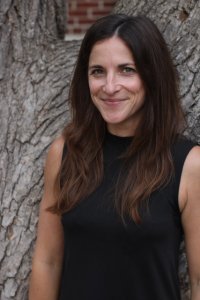Presented By: Global Islamic Studies Center
Interdisciplinary Islamic Studies Seminar (IISS) Workshop. Queer Liminality: Gender and Sexuality in Raafat Hattab’s "Ho(u)ria"
Sascha Crasnow, lecturer in Islamic art, U-M Residential College

Dr. Sascha Crasnow is lecturer of Islamic art in the Residential College at the University of Michigan. She received her Ph.D. in art history, theory, and criticism from the University of California San Diego in 2018. Her current book manuscript, "After the Intifadas: Art in the Age of Disillusionment," examines shifts in contemporary art production in the post-Second Intifada period among Palestinian artists living and making work within historic Palestine. This project, which is based on her dissertation research, has been solicited by Duke University Press.
Workshop Topic:
For LGBTQ individuals in Palestine, issues of gender and sexuality are inherently intertwined with their positions as individuals living under occupation. This is perhaps most notably visible through the eliding of Israel’s human rights abuses against Palestinians by Brand Israel (the primary pro-Israel propaganda project) through a portrayal of Israel as the singular gay-friendly, culturally progressive Middle Eastern country—a practice that has been termed “pinkwashing.” For Palestinians living within the state of Israel who identify as queer, they may feel caught between two societies into which they do not fit: Israeli society, where they are an outcast because of their Palestinianness, and Palestinian society, where they are an outcast because of their gender expression or sexuality. This leaves some individuals in a state of twofold liminality. In this paper, I utilize this notion of liminality as relates to the trans* experience discussed by Diane Dentice and Michelle Dietert to examine Ho(u)ria (2010), a video work by genderqueer Palestinian artist Raafat Hattab. Haatab’s video alternates between three scenes: a mermaid (Hattab) on the beach, Hattab’s aunt telling the story of her family’s expulsion from their homes during the Nakba (Arabic for “catastrophe” referring to the formation of Israel and expulsion of hundreds of thousands of Palestinians), and Hattab getting a tattoo of Arabic calligraphy on his chest. While on the surface appearing disparate, these three scenes all speak to the intrinsically interwoven nature of liminality, the omission of certain voices from the nationalist struggle, and the persistent fight for liberation, as embodied by the work’s title—houria, meaning mermaid, and horia, meaning freedom.
If you are a person with a disability who requires an accommodation to attend this event, please reach out to islamicstudies@umich.edu at least 2 weeks in advance of this event. Please be aware that advance notice is necessary as some accommodations may require more time for the university to arrange.
Workshop Topic:
For LGBTQ individuals in Palestine, issues of gender and sexuality are inherently intertwined with their positions as individuals living under occupation. This is perhaps most notably visible through the eliding of Israel’s human rights abuses against Palestinians by Brand Israel (the primary pro-Israel propaganda project) through a portrayal of Israel as the singular gay-friendly, culturally progressive Middle Eastern country—a practice that has been termed “pinkwashing.” For Palestinians living within the state of Israel who identify as queer, they may feel caught between two societies into which they do not fit: Israeli society, where they are an outcast because of their Palestinianness, and Palestinian society, where they are an outcast because of their gender expression or sexuality. This leaves some individuals in a state of twofold liminality. In this paper, I utilize this notion of liminality as relates to the trans* experience discussed by Diane Dentice and Michelle Dietert to examine Ho(u)ria (2010), a video work by genderqueer Palestinian artist Raafat Hattab. Haatab’s video alternates between three scenes: a mermaid (Hattab) on the beach, Hattab’s aunt telling the story of her family’s expulsion from their homes during the Nakba (Arabic for “catastrophe” referring to the formation of Israel and expulsion of hundreds of thousands of Palestinians), and Hattab getting a tattoo of Arabic calligraphy on his chest. While on the surface appearing disparate, these three scenes all speak to the intrinsically interwoven nature of liminality, the omission of certain voices from the nationalist struggle, and the persistent fight for liberation, as embodied by the work’s title—houria, meaning mermaid, and horia, meaning freedom.
If you are a person with a disability who requires an accommodation to attend this event, please reach out to islamicstudies@umich.edu at least 2 weeks in advance of this event. Please be aware that advance notice is necessary as some accommodations may require more time for the university to arrange.